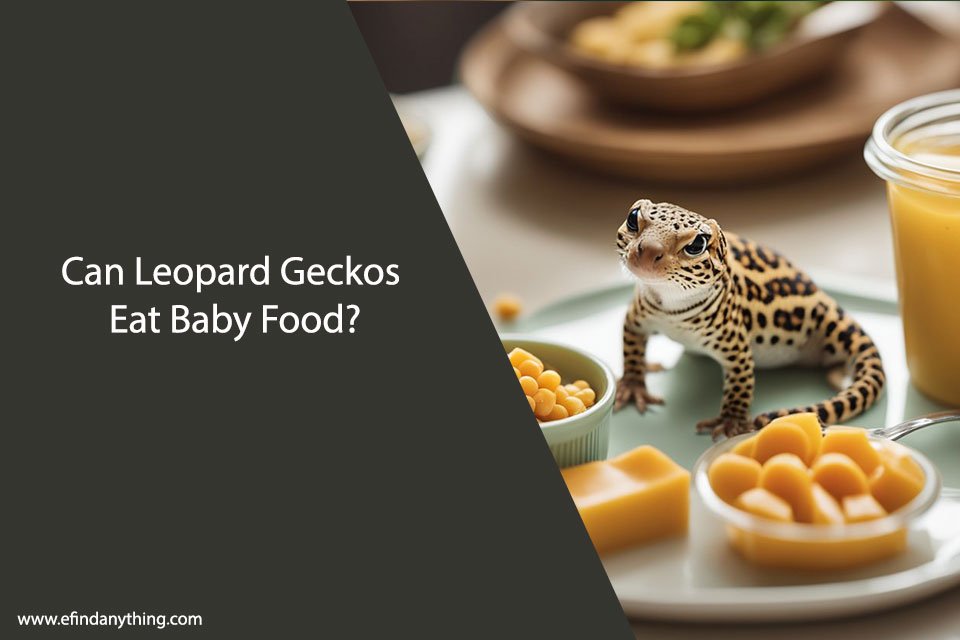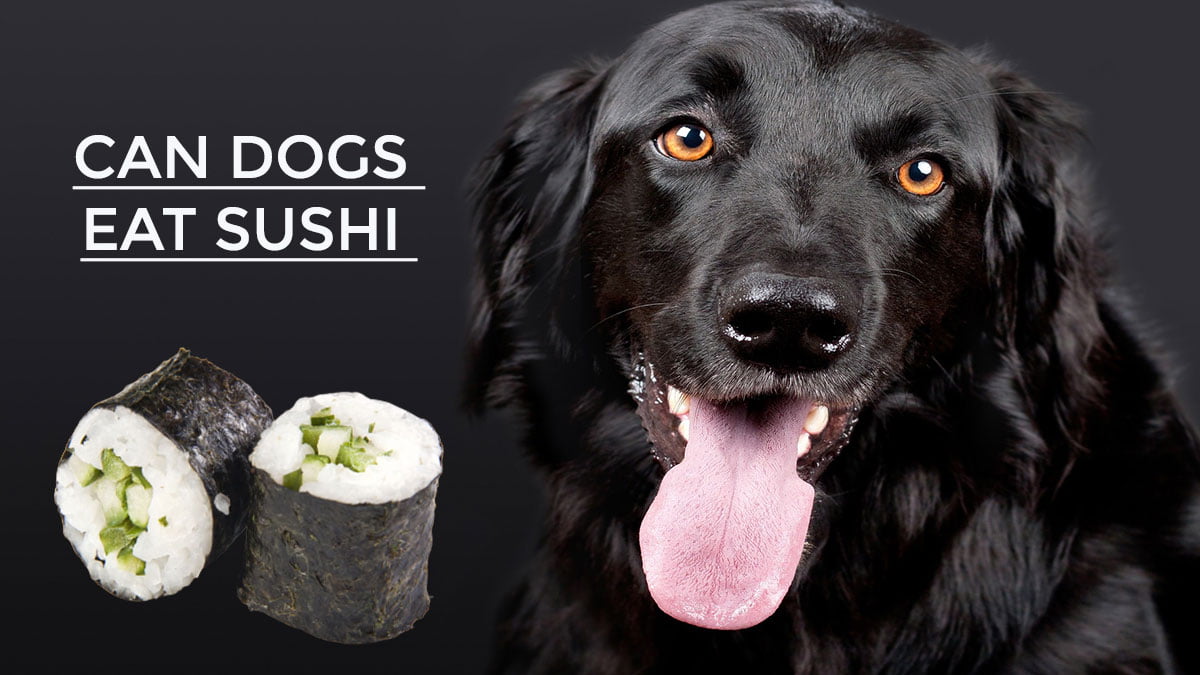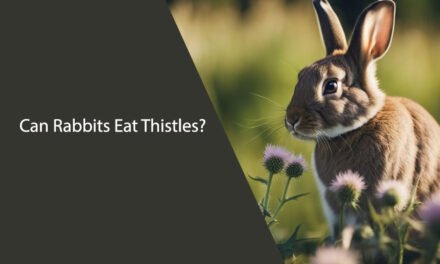Leopard geckos are fascinating creatures that make great pets. As with any pet, owners must ensure that they are providing their leopard geckos with a balanced and nutritious diet. While there are many commercially available gecko diets, some owners may wonder if baby food can be a suitable alternative. In this article, we will explore whether or not leopard geckos can eat baby food and provide some important considerations to keep in mind.
Baby food is a popular choice for parents of young children, as it is easy to prepare and provides a range of essential nutrients. However, when it comes to feeding baby food to leopard geckos, there are some important factors to consider. For example, not all types of baby food are suitable for geckos, and some may contain ingredients that can be harmful to their health. In this article, we will take a closer look at the nutritional content of baby food and assess whether it can provide a balanced diet for leopard geckos.
Table of Contents
Leopard Gecko Dietary Basics
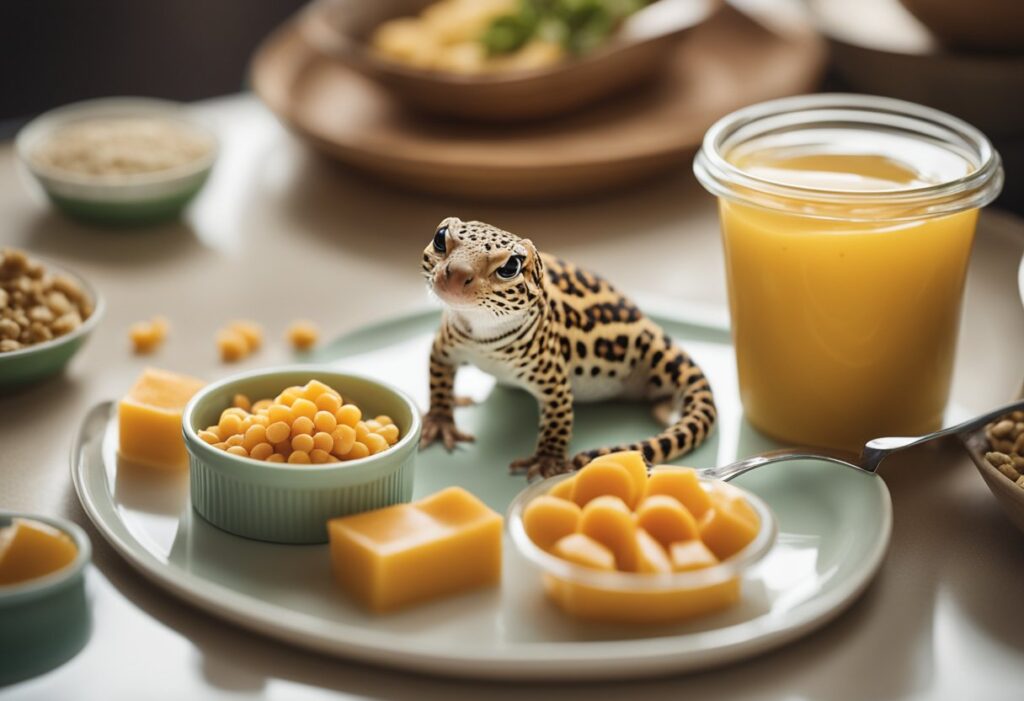
When it comes to feeding leopard geckos, it’s important to understand their dietary requirements. In this section, we’ll cover the basics of what leopard geckos need to eat to stay healthy and happy.
Nutritional Requirements
Leopard geckos are insectivores, which means they primarily eat insects. In the wild, they eat a variety of insects, such as crickets, mealworms, and waxworms. In captivity, it’s important to provide a varied diet to ensure they receive all the necessary nutrients.
Leopard geckos require a diet that is high in protein and low in fat. They also need calcium and vitamin D3 to maintain healthy bones. It’s important to provide a balanced diet that meets these nutritional requirements.
Common Foods and Diet
Leopard geckos can eat a variety of insects, including crickets, mealworms, waxworms, and superworms. It’s important to vary their diet and offer different types of insects to ensure they receive all the necessary nutrients.
In addition to insects, leopard geckos can also eat some fruits and vegetables. However, it’s important to note that they should not make up a large portion of their diet. Some safe options include mashed sweet potato, carrot, and squash.
While some people may suggest feeding baby food to leopard geckos, it’s not necessary and may not be the best option. Baby food can contain added sugars and preservatives that may not be beneficial to their health. It’s best to stick to a diet of insects and occasional fruits and vegetables to ensure they receive all the necessary nutrients.
Overall, providing a balanced and varied diet is key to keeping leopard geckos healthy and happy.
Understanding Baby Food
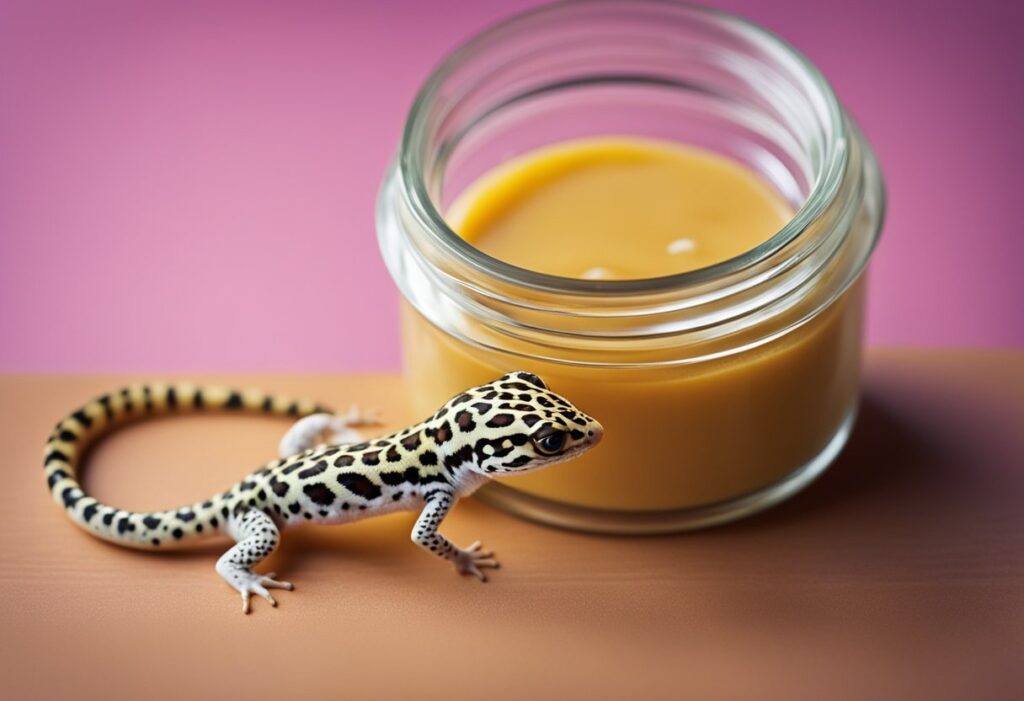
When it comes to feeding our leopard geckos, we often wonder if they can eat baby food. Baby food can be a great addition to their diet, but it’s important to understand what it is and what it contains.
Ingredients and Nutritional Content
Baby food is typically made from pureed fruits, vegetables, and meats. The ingredients are cooked and blended to create a smooth consistency that is easy for babies to eat. Some baby foods may also contain added vitamins and minerals.
When it comes to leopard geckos, it’s important to choose baby food that is made from safe ingredients. Avoid baby foods that contain onions, garlic, or other harmful ingredients. Look for baby foods that are made from fruits and vegetables that are safe for leopard geckos, such as carrots, sweet potatoes, and peas.
In terms of nutritional content, baby food can be a good source of vitamins and minerals for leopard geckos. However, it’s important to note that baby food is not a complete diet for them. It should be used as a supplement to their regular diet of live insects.
Types of Baby Food
There are many different types of baby food available, including single-ingredient purees and mixed-ingredient blends. Single-ingredient purees are made from one type of fruit or vegetable, while mixed-ingredient blends combine several different fruits and vegetables.
When choosing baby food for your leopard gecko, it’s important to read the label and choose a variety that is made from safe ingredients. Look for baby foods that are free from preservatives, additives, and artificial flavors. It’s also a good idea to choose baby foods that are organic, as they are less likely to contain harmful chemicals.
In conclusion, baby food can be a great addition to your leopard gecko’s diet, but it should be used as a supplement to their regular diet of live insects. Choose baby foods that are made from safe ingredients, and read the label to ensure that they are free from harmful additives and preservatives.
Feasibility of Baby Food for Leopard Geckos
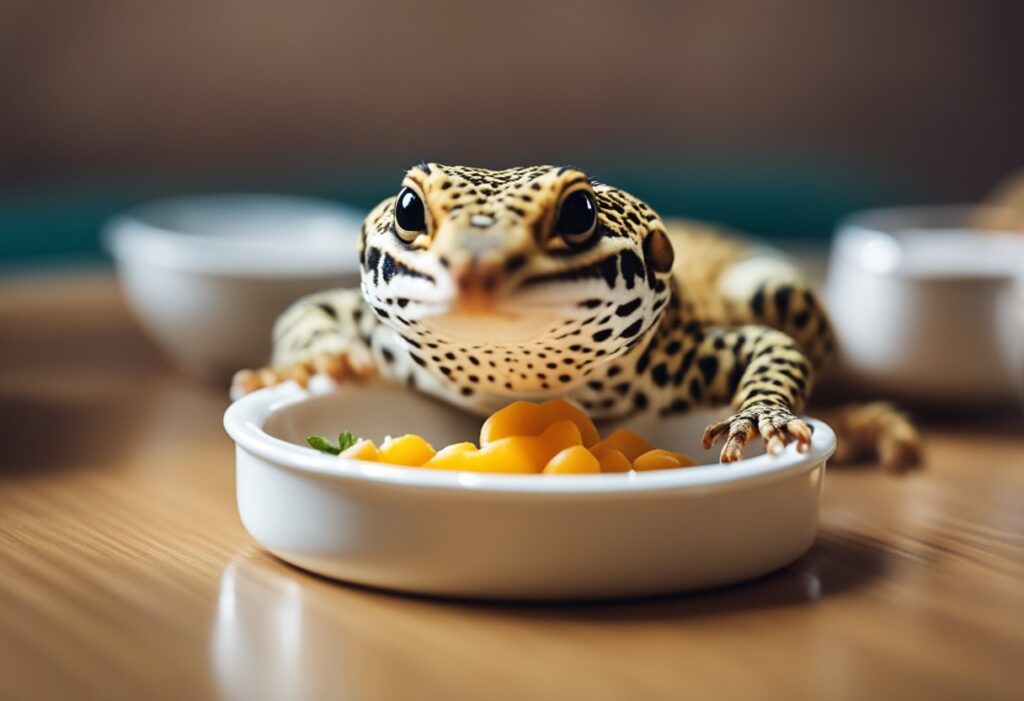
Leopard geckos are known for their diverse diet, consisting of insects and worms. However, some owners may wonder if baby food is a viable option for their pets. In this section, we will explore the feasibility of feeding baby food to leopard geckos.
Potential Benefits
Baby food is a convenient option for owners who may not have access to live insects or want to provide their geckos with a different type of food. Some baby foods are made with high-quality ingredients, such as fruits and vegetables, which can provide essential nutrients for leopard geckos.
Additionally, baby food can be a good option for leopard geckos who are recovering from illness or injury. The soft texture of baby food can be easier for geckos to digest and can help them regain their strength.
Possible Risks
While baby food may seem like a good option, there are some potential risks to consider. Some baby foods may contain ingredients that are not suitable for leopard geckos, such as added sugars or preservatives. It is important to carefully review the ingredients list before feeding baby food to your gecko.
Another concern is that baby food may not provide enough protein for leopard geckos. Protein is an essential part of their diet, and a lack of it can lead to health problems. If you choose to feed baby food to your gecko, it should be supplemented with other protein-rich foods, such as insects or worms.
In conclusion, while baby food may be a convenient option for leopard gecko owners, it is important to carefully consider the potential risks and benefits. If you choose to feed baby food to your gecko, make sure to review the ingredients list and supplement it with other protein-rich foods.
Safe Feeding Practices
When feeding leopard geckos, it is important to follow safe feeding practices to ensure their health and wellbeing. Here are some guidelines to follow:
Portion Control
Leopard geckos have small stomachs and can easily become overweight if overfed. As a general rule, we recommend feeding them an amount of food that is no larger than the space between their eyes. This ensures that they are getting enough food without overeating.
It is also important to avoid feeding them too many treats, such as baby food, as these can be high in sugar and lead to obesity and other health problems. Treats should only be given in moderation and as part of a balanced diet.
Frequency of Feeding
Leopard geckos should be fed every other day, or 3-4 times per week. Feeding them too frequently can lead to obesity and other health problems, while feeding them too infrequently can result in malnutrition.
It is important to note that leopard geckos are nocturnal, so they are most active and hungry at night. We recommend feeding them in the evening to ensure that they are able to digest their food properly and avoid any health issues.
By following these safe feeding practices, we can ensure that our leopard geckos are healthy and happy. Remember to always monitor their weight and adjust their diet as needed to maintain a healthy weight.
Alternative Food Options
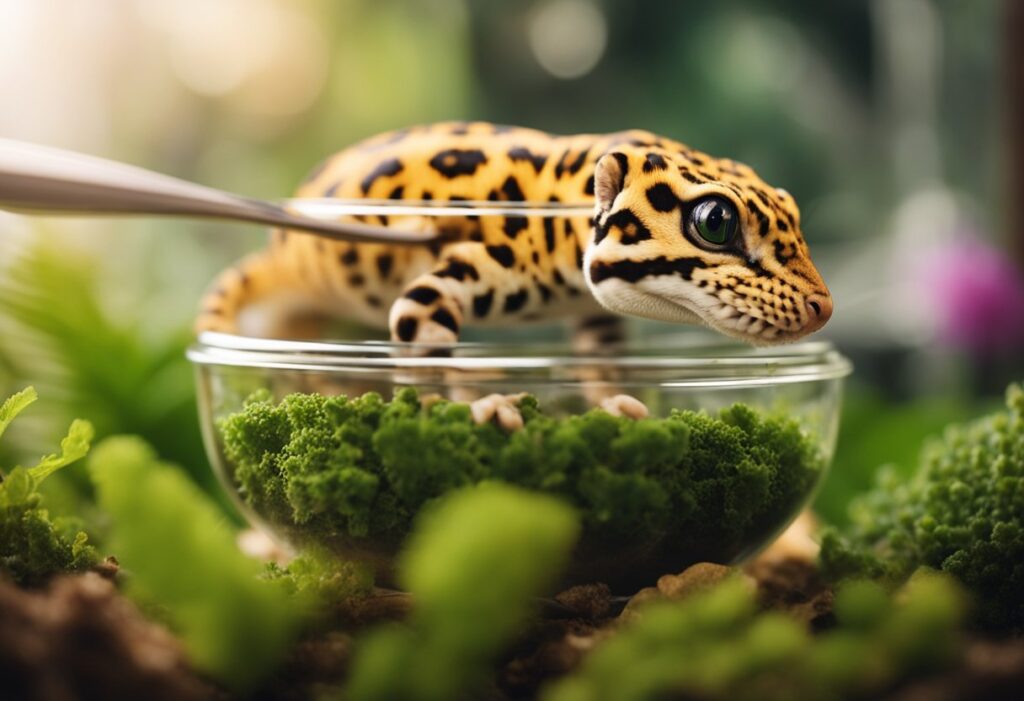
When it comes to feeding leopard geckos, there are several alternative food options available. While insects are the primary food source for these reptiles, other options can be added to their diet to provide variety and balance.
Live Prey
Live prey is the most natural and preferred food option for leopard geckos. Insects such as crickets, mealworms, and dubia roaches are readily available and can be purchased from pet stores or online retailers. It is important to ensure that the insects are gut-loaded with nutrient-rich foods before feeding them to your gecko.
Commercial Diets
Commercial diets are another option for feeding leopard geckos. These diets are available in the form of pellets or powders and are formulated to provide a balanced diet for your pet. However, it is important to note that these diets should not be the sole source of food for your gecko and should be supplemented with live prey.
Supplements and Vitamins
Supplements and vitamins can also be added to your gecko’s diet to ensure they are getting all the necessary nutrients. Calcium and vitamin D3 supplements are particularly important for leopard geckos, as they require these nutrients for proper bone growth and development. It is important to follow dosage instructions carefully and not to over-supplement.
In conclusion, while live prey is the preferred food source for leopard geckos, alternative food options such as commercial diets and supplements can be added to their diet to provide variety and balance. It is important to ensure that your gecko is receiving all the necessary nutrients for proper growth and development.
Health Considerations
When considering feeding baby food to your leopard gecko, it is important to keep in mind their overall health and well-being. Here are some health considerations to keep in mind:
Signs of Dietary Imbalance
Leopard geckos require a balanced diet to maintain their health. If they are not receiving the proper nutrients, they may exhibit signs of dietary imbalance. Some signs to look out for include:
- Stunted growth
- Lethargy
- Weight loss
- Weakness
- Poor appetite
If you notice any of these signs, it is important to reassess your leopard gecko’s diet and consult with a veterinarian if necessary.
When to Consult a Veterinarian
If you are unsure about whether baby food is a suitable addition to your leopard gecko’s diet, it is always best to consult with a veterinarian. They can provide you with expert advice on what foods are appropriate and how to ensure your leopard gecko is receiving a balanced diet. Additionally, if you notice any signs of dietary imbalance, it is important to seek veterinary care as soon as possible to prevent further health issues.
Overall, while baby food can be a nutritious addition to your leopard gecko’s diet, it is important to keep these health considerations in mind to ensure their overall well-being.
Frequently Asked Questions
Is it safe to offer baby food to leopard geckos?
While baby food is not toxic to leopard geckos, it is not their natural diet. Therefore, it is not recommended to feed baby food to leopard geckos on a regular basis.
What are the potential risks of feeding baby food to leopard geckos?
Leopard geckos may develop health problems if they consume too much baby food. The high sugar content in some baby foods can cause digestive problems, such as diarrhea. Additionally, some baby foods contain preservatives or additives that may be harmful to leopard geckos.
Which types of baby food, if any, are acceptable for leopard geckos?
If you decide to feed baby food to your leopard gecko, it is important to choose a brand that does not contain any harmful ingredients. Organic baby food without added sugars or preservatives is the best option. It is also recommended to choose baby food that is high in protein and low in fat.
How should baby food be incorporated into a leopard gecko’s diet?
Baby food should not be a staple in a leopard gecko’s diet. It should only be offered as an occasional treat. A small amount of baby food can be mixed with the gecko’s regular food or offered separately in a shallow dish.
What emergency food options are available for leopard geckos?
In case of emergency, there are several options for feeding leopard geckos. Commercially available reptile food, such as mealworms or crickets, can be offered. Additionally, mashed fruits or vegetables can be used as a temporary food source.
Why is baby food not considered a staple diet for leopard geckos?
Leopard geckos are carnivorous and require a diet high in protein. Baby food does not provide the necessary nutrients for leopard geckos to thrive. A diet consisting mainly of baby food can lead to health problems and malnutrition.

